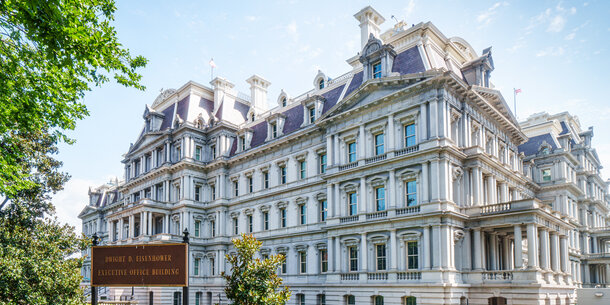This was a good week for civil liberties in the Senate. Lawmakers assembled to vote on three amendments that would strengthen privacy protections in the USA Freedom Reauthorization Act, a bill passed by the House in March to renew certain provisions of the Foreign Intelligence Surveillance Act (FISA). Even though only one amendment passed, two of them did far better than expected, paving the way for the House to pass a better bill — and for Congress to enact stronger privacy protections in the future.
Background: a cycle of overreach and reform
The immediate purpose of the bill is to reauthorize three provisions of FISA that were created or amended by the USA Patriot Act following the 9/11 attacks. The best known of these is Section 215, which allows the government to get an order from the secret Foreign Intelligence Surveillance Court (known as the FISA court) to obtain “any tangible thing,” as long as it can show that the “thing” is relevant to a foreign intelligence or international terrorism investigation. This is an extraordinarily low standard that enables the government to collect Americans’ personal information even if they are not suspected of any wrongdoing.
In 2013, as a result of Edward Snowden’s disclosures, the public learned that the NSA had secretly been using Section 215 to collect Americans’ phone records in bulk. After a federal appeals court found the program to be illegal, Congress passed the USA Freedom Act, which sought to prohibit bulk collection under Section 215 and other FISA authorities. But Congress also created a scaled-down version of the phone records program, under which the NSA could collect the phone records not just of suspected terrorists, but anyone who had called or been called by them.
In 2018, the NSA announced that it would delete three years’ worth of phone records, because it had been regularly — albeit unintentionally — collecting information it was not authorized to have. Several other FISA-related scandals followed. Most notably, the Justice Department’s inspector general found that the government’s applications for FISA court warrants to conduct surveillance of Americans and others inside the United States were riddled with errors and omissions.
These revelations showed that major changes to the law were necessary to protect Americans’ civil liberties. The bill passed by the House in March, however, fell disappointingly short. Its most significant reform was ending the phone records program, but that was almost a foregone conclusion — the government already had stopped using the program, concluding that its benefits were outweighed by its costs. Beyond that, most of the reforms included in the bill either were extremely modest or were undercut by broad exceptions.
Why was the bill so unambitious? In short, its sponsors were concerned that a bill with more meaningful reforms would be unable to pass in either the House or the Senate. Thus, when it became clear that a markup in the House Judiciary Committee would result in the adoption of amendments to strengthen civil liberties protections, the bill’s sponsors canceled the scheduled markup, and the bill was rushed to a floor vote with no debate and no chance to vote on amendments.
In the Senate, however, lawmakers on both sides of the aisle insisted on the opportunity to offer amendments, and Majority Leader Mitch McConnell (KY) was forced to accede to this request. Senators voted this week on three amendments to bolster privacy protections in the bill, and in two cases, the results were surprising.
The Wyden-Daines amendment: requiring warrants for web browsing and search history
The first amendment, offered by Sens. Ron Wyden (D-OR) and Steve Daines (R-MT), would have prohibited the use of Section 215 to collect Americans’ internet search history and web browsing records. This is some of the most private information imaginable, and as Senator Wyden pointed out, protecting it has become even more important now that most Americans are subject to a shut-down order and are “living their lives online.”. Under the Wyden-Daines amendment, the government would have been required to get a probable cause warrant from the FISA court or a regular court to obtain this information. It would no longer have the easy access afforded by the weak “relevance” standard.
In talking points circulated among Capitol Hill offices, McConnell argued — falsely — that the Wyden-Daines amendment would prohibit the government from acquiring any internet data. He offered hypotheticals intended to show that easy access to internet search history was critical to preventing terrorist attacks. Such scare tactics have a strong track record of success. Moreover, while Congress is occasionally willing to strengthen oversight and transparency of intelligence activities, it almost never raises the substantive legal standard for collection. Observers were skeptical of the amendment’s chances.
This time, however, McConnell might have overreached. His talking points conveyed the impression that the government is actively engaged in the warrantless collection of Americans’ internet search history. This did not sit well with progressive Democrats or with Republicans newly attuned to privacy concerns in the wake of the botched Carter Page applications. Sixty votes were needed for passage; the final tally ended up being an achingly close 59–37, with 10 Democrats voting no and 24 Republicans voting yes. At least two of the senators who were not present in the Capitol and therefore did not vote — Sens. Bernie Sanders (I-VT) and Patty Murray (D-WA) — would likely have voted for the amendment. For civil liberties advocates, it was a moral victory and a bitter defeat at the same time.
The Leahy-Lee amendment: empowering court-appointed advocates and increasing accuracy
Next up was an amendment offered by Sens. Patrick Leahy (D-VT) and Mike Lee (R-UT) to improve the workings of the FISA court. The USA Freedom Act had established a panel of experts who could appear before court to present perspectives and arguments other than the government’s. The act created a presumption that these experts would participate in cases involving novel or significant interpretations of the law. The Leahy-Lee amendment expands that presumption to include cases involving significant First Amendment concerns; cases involving new technologies; requests to approve entire surveillance programs; and sensitive matters involving political, religious, or journalistic activity. In addition, it gives these experts access to all materials before the court in any matter in which they participate. These measures would promote meaningful adversarial testing of the government’s arguments in those cases with the highest stakes for Americans’ privacy.
The Leahy-Lee amendment also includes provisions to guard against the submission of flawed or incomplete FISA applications. It requires the government to disclose to the court any information or materials that go against its case. The attorney general must adopt “accuracy procedures,” designed to ensure that every application is correct and complete. And the DOJ inspector general must report to Congress and make public the results of the department’s internal accuracy audits.
Given the amendment’s focus on procedural reforms rather than substantive limits on collection, it was expected to outperform Wyden-Daines. But few observers expected it to sail through as smoothly as it did: the final vote count was 77–19, indicating an unprecedented level of bipartisan support for enhancing FISA’s privacy protections.
The Paul amendment: removing Americans from the FISA system
The third amendment, offered by Sen. Rand Paul (R-KY), would have prohibited the government from using FISA to target Americans and required the government to obtain a regular criminal warrant instead. The amendment also would have barred the government from using information collected under either FISA or Executive Order 12333 (which governs overseas foreign intelligence surveillance) against Americans in investigations or court proceedings.
As expected, this amendment — which would fundamentally change the legal framework for foreign intelligence surveillance — received little support, with only 11 senators voting in favor. Senators might have had different reasons for opposing it, however. Many no doubt believe that the government should not be held to the strict standards of the criminal justice system when collecting foreign intelligence. But some were likely concerned that the government, with FISA taken off the table, would fall back on claims of inherent executive authority to conduct surveillance. Indeed, Sen. Richard Burr (R-NC) suggested as much during an earlier phase of the debates. With all its flaws, FISA is preferable to a system of surveillance that lacks any congressional or judicial oversight whatsoever.
Looking forward: the House and beyond
After the Paul amendment failed, senators voted 80–16 to pass the bill as amended by Leahy-Lee. It now goes back to the House. When the House votes this time, though, the political context will have shifted significantly — and so should the assumptions underlying the vote. The House bill was extremely conservative in its reforms in part because its sponsors feared that more robust legislation could not pass. The Senate vote makes clear that it can. The Senate’s support for the protections in the Leahy-Lee bill, in particular, was overwhelming. There is no reason for the House to reject this important change.
Moreover, we now know that a substantial majority of senators — more than 60 — are in favor of a warrant requirement for collecting internet search history and web browsing records. Their support mirrors the intuitive sense, shared by most Americans, that internet activity is highly personal and should not be readily available to the government. The House should adopt the Wyden-Daines amendment when it considers the bill.
Finally, the Senate’s votes this week bode well for broader reforms in the future. In the years after 9/11, concerns about the civil liberties impact of surveillance were largely limited to members on the progressive left and libertarian right. But privacy is increasingly becoming a salient issue for members across the political spectrum. There is much more than can and should be done to protect Americans’ rights. Web browsing records, for instance, are not the only kinds of records that reveal highly sensitive information — think about medical records or biometric data. And the most sensitive information of all — communications content — can be accessed by the government without a warrant if “incidentally” collected under Section 702 of FISA.
In short, we are long overdue for a hard look at the many ways in which our surveillance laws fail to safeguard Americans’ privacy. The Senate’s actions this week provide some hope that we could see more progress on this front in the not-too-distant future.






